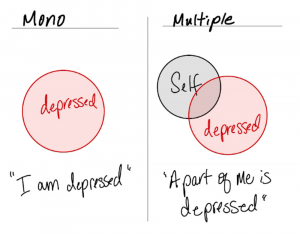What is IFS?
The Beginners Guide to IFS
Part 1 of 3: #multipleandproud
Today I’m going to share with you the following:
Three core concepts of why I see being multiple as a good thing.
How being #multipleandproud changed my life
How being #multipleandproud can change your life
I don’t mean to be dramatic; however, once you read what you are about to read, you can’t unread it. When I came across IFS, I had no idea what I was getting myself into. As a trauma therapist, I had heard about its powerful impact in working with childhood trauma survivors like myself. As a therapist specializing in working with trauma across the lifespan, I knew I had to check it out.
IFS stands for Internal Family Systems and is an evidence-based model of psychotherapy (a.k.a it has been researched and shown to be effective, especially as a trauma treatment for anyone with an ACE score of 1+) and has in the last 3-5 years become extremely popular within the therapeutic and general community.
It has recently been featured in many different places, such as :
Jonathan Van Ness’s New York Times Bestselling book Over the Top: A Raw Journey to Self Love
Featured by New York Times Best Selling author Gabrielle Bernstein in a podcast entitled“The Therapy That Changed My Life — Internal Family Systems with Richard Schwartz”
Tim Ferriss’s podcast The Tim Ferriss Show
Just to name a few.
I originally heard about it through my therapist, who recommended it to me, and also read the then recently released smash hit by Dr. Bessel Van der Kolk The Body Keeps the Score: Brain, Mind, and Body in the Healing of Trauma.
I had an interesting beginning to the IFS community that I shared in my podcast with IFS author Tammy Sollenberger on her podcast The One Inside, and go into more detail about how IFS has personally changed my life. So, IFS is an evidence-based psychotherapy model rapidly gaining popularity in the therapeutic and general communities and fundamentally changed my life.
So what’s IFS all about? Here are the three core components that I share with my clients regularly.
3 Core Principles of IFS
1
We are naturally multiple…and this is a good thing.
2
Everything you are seeking is already at your center, IFS looks at what gets in the way.
3
No bad parts.
#1 We are naturally multiple… and this is a good thing.
Many of us were raised to believe we are a singular mind. However, IFS holds the model of multiplicity, which supports the belief system that we are naturally multiple.
Now, this may seem like not that big of a deal on the surface. However, it is a game changer if you or someone you know experiences suffering of any kind. It doesn’t even have to be debilitating types of suffering. The general stress experienced as a part of society is enough. The picture below visually contrasts the mono and the multiple paradigms. With the mono mind, if I am depressed, “I” am depressed because “I am” a singular mind. The multiple mind model acknowledges the feelings of depression but sees them as a part of you rather than the “I am.”
Three dead ends of the mono mind:
1. Your suffering becomes your identity: “I am” is an extremely powerful statement to be used with great intentionality.
The mono mind model states “I am” depressed, then there is no other option on the table, and somehow the depressed being is the one who has to heal from the depression. It’s tricky and oftentimes very defeating…
2. Highly pathologizing: If “I am my addiction,” it is easy to see that this is a “bad” thing that needs to be eradicated.
However, at the core of many of these behaviors is an attempt to soothe the pain of shame or abandonment. So, adding a truckload of guilt and shame onto the experience through a critical model only worsens the problem.
3. Supports a deficit model: You start believing you must be taught “skills” for how to have more joy because if you are depressed, it must be because you don’t have the skills to be happy.
Please, please be mindful that this is the dominant model in most psychotherapy (CBT, DBT, etc.) for many reasons, most of which would be the topic of an entire book in and of itself and that I won’t get into here. I also am not saying there is no place for skills development in healing. I am a huge believer in skills development, and we even use them in IFS; however, it is from a fundamentally different mindset.
Three ways being naturally multiple is a good thing…
1. Your suffering isn’t your identity: When you experience suffering and use the multiple-mind model, you can immediately find spaciousness and grounding that other pathways don’t have.
If I have a part of me that is experiencing depression and there is ALSO another energy that is able to meet with it, I have the ability to have a calm anchor in the storm of the depression, even if the storm is not over.
2. Non-pathologizing: When we use the multiple mind model and understand behavior such as addiction, perfectionism, and distraction, we see these in IFS as protectors.
The parts of us show up to try and help us get our needs met, even in the most destructive ways. This is why we can say in IFS; there are “no bad parts” because even the most destructive ones are seen as an attempt, albeit a very unhelpful and sometimes harmful attempt, to help a system experiencing pain in many fashions.
3. Supports a “you are good inside” model: Where you start believing there is good inside you at your core. We just need to see what’s getting in the way of this.
For example, in IFS, we know that you are calm at your core, and we work to help get you in a relationship with the parts of you that are experiencing anxiety of any kind. The metaphor of the sun and the clouds is the best example of this. When it is cloudy or nighttime, we don’t believe it is that way because there is no sun. We believe that because there is something in the way of the sun. Versus the deficit, the model says it’s dark because you don’t have a sun, and therefore we have to teach you how to have a sun out of nothing. I prefer the first model myself. This is similar to what my favorite poet Rumi writes, “We do not need to seek love; we need to seek and find everything that gets in the way of it.”
How this changed my life.
For me, the concept of being multiple and that being a good thing was a bit hard to take in. I am traditionally a very left-brained person that lived previously about 98% in her head. I am a cis-gendered, heterosexual female, Colorado native, so my view of the world is highly influenced by the community I live in. My western worldview made it particularly challenging for me to be open to the idea that we have “parts” of us. I explain more about my journey into IFS in a podcast episode with the lovely IFS author and practitioner Tammy Sollenberger if you would like to learn more.
However, as an adult child of an alcoholic who struggled with pretty crippling anxiety, panic attacks, and suicidal ideation, I was open to trying anything. As I started to bat around the idea that there might be a “part” of me that is holding this anxiety and that the anxiety was not who I was, I found a sliver of an opening in my healing that I previously had never found with any other effort (Religion, EMDR, yoga, meditation, etc.). If I am not my anxiety and this part holding all this panic (which turned out to be in large part two different parts of myself holding onto abandonment terror and another part holding onto the chaos of my childhood growing up). And I can ask those parts to give me space and start to get into a relationship with them and say things like, “this is important; I am here; tell me more” I found a peace inside that I never once knew was possible.
How this can change your life.
If you are one of the humans on this planet who struggle, in any way, at any point in your life, this concept is an absolute game changer. Whatever you are struggling with, using the multiple mind model will give you an even sliver of space between the suffering and you, which will have an enormous benefit and bring hope. For example, if you were depressed, you could say, “I am anxious,” and I need to fix that. In the multiple mind model, we look at I am depressed and what’s getting in the way of your calm that is already there. Knowing that the calm (or whatever it is you seek) is already inside you can give that ray of hope that previously might have been elusive at best.
This is why at Sentur, we are #mutlipleandproud. We believe that one of the core principles of healing trauma from the past is to get into a compassionate, curious relationship with the pain before the pain is released. We offer easy-to-use exercises like unbending from your parts, meditations about accessing more Self-energy, and visuals such as a real-time parts map for you to live your life #multipleandproud.










